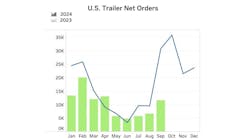Has Donald Trump the candidate and president-elect written some campaign checks on the U.S. economy that President Trump can’t cash? The odds—and history—say that he has very likely over-promised and will under-deliver, according to a transportation economist who, coincidentally, was a University of Pennsylvania classmate. But, basically, that makes Trump just like every other president. And that doesn’t mean the Trump economic team won’t try, or that White House policy won’t have an impact on trucking.
Noël Perry, principal at Transportation Economics and a partner at FTR Intelligence, explains what to expect in the next four years in this Inauguration Day Q&A.
Historically, how much difference does White House economic policy make?
PERRY: This is highly debatable. Traditional economists think there’s a huge effect and politicians, when times are good, they think they did it; when times are bad, they say it’s the economy. So in their view, the president has immense power in upturns and no power in downturns.
But the evidence says they have very little power. Did George W. Bush start the Great Recession? No. Did Obama get us out? No. Is there any difference in the policies? No.
If you compare Hillary Clinton and Trump, both are profoundly Keynesian in the sense that they believe the president—and the government—has a lot of effect on the economy. They both ran on that, and both would address it in their policy. The only difference between Clinton and Trump is she would tend to spend more and he would tend to do more tax cuts. The effect on the federal deficit would be bad in both cases—and from what they proposed, his effect on the deficit would be worse.
The one big difference is the matter of regulation. The Obama administration was relatively aggressive on climate change and greenhouse gas reduction. Trump won’t be. And it’s probable the degree of enforcement will be more relaxed.
Trump has promised to fix the economy and Make America Great Again. What needs to be fixed?
PERRY: There’s nothing wrong with economy right now, and there’s very little to do. The export numbers don’t look very good, and his trade policies aren’t going to help that.
It’s possible the fourth quarter was weaker than we think, but the third quarter was quite strong and all of the smaller indicators looked pretty good. Employment’s good. So the answer is: Don’t do anything.
But he believes we should have a major tax cut, and that will take us from 2% growth to 4%. He and the Republicans [in Congress] are going to cut taxes, but they’re not going to cut spending proportionally, so there will be an increase in the deficit, like Regan and George W. Bush did.
And there is very questionable evidence that it works. The supply-side Republicans all believe that it works magnificently, and if you’re a free-market economist, an Austrian economist like me, then there’s no evidence. But what is incontrovertible is that tax cuts dramatically increase the deficit. And so far, people keep lending us money at 0% interest so we keep borrowing and giving it back to ourselves in tax breaks.
It scares me, but it’s a 2025 issue. It might help the economy for a year—we could get 3-3.5% GDP growth in 2017, which everybody will love—but the next recession will be worse.
You’ve painted a pretty grim picture about government debt. What can be done to get politicians to address it?
PERRY: It depends on what you believe, but it is grim. If you take the Austrian approach, there are profound distortions on what we spend money on and the economy is less efficient than it should be—but it’s almost impossible to prove it.
The issue is that fixing the problem requires sacrifice. Here’s is the proper campaign slogan if you believe what I believe: ‘I’m going to raise your taxes and cut your benefits—but I’m going to do it fairly.’ Who would be elected today on that platform?
What both Trump and Clinton said was, ‘I’m going to bring jobs.’ He said I’m going cut your taxes; she said I’m going to increase your benefits. But there’s no evidence—none whatsoever—that people will vote themselves hardship beforehand, when it’s easily fixed. It’s human nature.
At some point, the house of cards is going to fall, and when it does we’re going to have a depression.
What about Trump’s team: Are you pleased with his advisors, or concerned?
PERRY: They haven’t said much, but you can predict what they’re going to do. The entire financial community, and most big business people, believe in big government and powerful leaders. They all think they can do something, so they’re going to do something. They’re going to be aggressive—even though the vast majority of evidence about government interference in the economy over the last 100 years says it won’t work.
There are three major differences, with regard to policy—putting aside Trump’s whole approach to communication, which is radical.
One is the approach to environmental regulations and global warming. The Democrats are for it, the Republicans are not.
The second thing is the Democrats like to spend money and the Republicans like to cut taxes. In neither case do they balance the other side of the ledger.
The third difference is in the people the president will appoint to the Supreme Court, which has very little economic impact.
What about Trump’s tough talk on trade? Who wins a trade war?
PERRY: We have the strongest economy in the world right now. It’s highly unlikely Trump would start a trade war. People believe he will do rash things, but I don’t think he will. He is outspoken, he’s outrageous—but he’s not stupid.
It’s possible one of our trade partners will overact to something he’s said. But in almost every case, [the U.S.] is the big importer. Take Mexico or China: Let’s say we had a trade war. We both lose, but Mexico and China lose a lot more than we do. There’s a lot of rhetoric, but is sure as heck doesn’t benefit them.
The risk with China is not trade, it’s all those treasury bills the Chinese hold. The Chinese could throw us into recession if they flooded the market with treasury bills, and in order to sell more we’d have to raise interest rates. It would be Pyrrhic victory [for the Chinese], and it’s not in their interest, but that’s the stick they have in their hand. It’s not cutting off the supply of TVs, it’s those Treasury bills.
But I don’t think it’s going to happen. There will be a hand waiving and declaring victory without much change. It’s like Ford brining back jobs from Mexico. The fact is those jobs are coming back, they’re being automated. Both Hilary and Donald promised the people in Flint manufacturing jobs, and they were both lying through their teeth, in economic terms.
Manufacturing will be coming back because of automation, but it’s not going to create thousands of jobs; it’s going to create 50, for people in white coats.
Getting back to trucking, what are a couple of things fleet executives should be aware of?
PERRY: They’ll want to keep their eye on fuel taxes and tolls.
They’ll want to keep their eye on the National Labor Relations Board: It’s going to be much more favorable to trucking. The big issue is the reclassification of drivers. The Trump administration is not going to push it the way the Obama administration did.
The pace of regulations coming out of the FMCSA is going to slow.
And they’re going to look for tax breaks. Executives, being conservative Republicans, are all fairly happy to have a Republican majority and a Republican president—so they might spend a little more. It’s a mild positive—but no more than that. If they hope for more, they’re naïve.
And the people that are still ordering big-nosed tractors and getting miles per gallon less than everybody else can continue to do that. Owner-operators are going to love his rhetoric, although it’s not clear how a billionaire real estate executive is connected with the common people.
Finally, what lessons might Trump learn about the economy from previous presidents?
PERRY: He can learn from the combination of Carter and Reagan. Reducing regulation clearly helped—Carter doesn’t get the credit he deserved. Trump can learn from Bill Clinton in that balancing the budget creates a lot of growth. That era, beginning with Carter and ending with George W. Bush’s tax cuts, was very, very good economically—and relatively better against the economy we’re getting now.
The U.S. has been very, very wise—and all of our presidents are part of this—in restricting the growth of government. Compare us to almost any other country in the world and we’re far more market oriented, and therefore more efficient and more prosperous.
However, no president has had the courage to make the dramatic move back to what we need. Why do we still subsidize ethanol, etc. etc.? Because democracy is messy. Like Churchill said, it’s a terribly inefficient form of government except we’ve tried everything and nothing else works.
I’d also like to say that Trump’s communication style is a radical departure. We know that it got him elected in a way that everybody didn’t expect. And it may well allow him to communicate better than his predecessors. People say that he’s crazy for arguing with reporters and that he shouldn’t use Twitter. Why not? It may that we’re just going to have to learn to listen to our politicians in a different way.
The most important thing that I’ve learned from this—I predicted that he would lose—is that he is a real phenomenon. People are saying he’s illegitimate: He’s not. He got elected in the same that Franklin Delano Roosevelt did. He represents the feelings of a lot of Americans, and he’s learned to communicate in ways that are very effective. It’s time for us to take him seriously. I hope he does well, and I’ll be bragging on him as a Penn grad.








